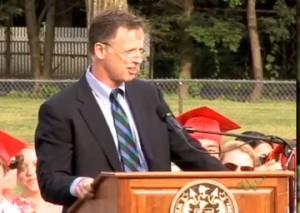 Excessive parental path-charting is one of my pet peeves. I work with so many clients who struggle with the consequences of such charting: unrelenting anxiety about not being exceptional, not being the best, not being good enough, not properly achieving the “shoulds” that lead to success. I explore with them what a successful life might look like for them, and the different ways they can get there.
Excessive parental path-charting is one of my pet peeves. I work with so many clients who struggle with the consequences of such charting: unrelenting anxiety about not being exceptional, not being the best, not being good enough, not properly achieving the “shoulds” that lead to success. I explore with them what a successful life might look like for them, and the different ways they can get there.
In this context, I was pleased to read about the recent “speech that went viral.” David McCullough Jr., an English teacher, told graduating seniors at Wellesley High School in Massachusetts recently, “You are not special. You are not exceptional.” A few days later, in a concise, and poignant response to the huge media brouhaha created by his commencement speech, McCullough wrote a short piece for Newsweek Magazine (My Turn on the ‘You’re Not Special’ Speech: After my commencement speech that stunned America, 6.18.12)
I share my favorite parts here with you.
* * *
The other day, I found myself in a small glass room with an honest-to-goodness Nobel laureate. This came to pass because a week earlier I had told the members of the Wellesley High School class of 2012 that they are not special. While the well-meant attentions of their parents and the advantages they’ve enjoyed (or taken for granted) might have led them to think otherwise, none of them, I said, matters more than anyone else, because everyone is special, everyone matters—all 6.8 billion of us. Simple logic, really. Along the way I tried to give them a few laughs, some thoughts to ponder, and, at the end, an exhortation to make for themselves, and for the rest of us, extraordinary lives, abundant in energy and guided by a spirit of selflessness. It was a lovely ceremony, and the speech was well received.
Enter the Nobel laureate: economist and New York Times columnist Paul Krugman. We spent half an hour sitting a few feet apart, each awaiting his turn on CBS This Morning. He was busy at his laptop. I was busy being nervous. We did not speak to one another. He is a smallish man, I can report, with a gray beard, a professorial mien, and sensible shoes. He is also, as we all know, powerfully smart, supremely accomplished, hugely influential.
And I’m willing to bet he never went to lacrosse camp.
Or to a four-day tourney of any kind in Orlando.
In fact, I’ll bet he never even went to economics camp or sat three afternoons a week at age 12 with an economics tutor. And, further, I suspect his wonderfulness was not celebrated when he had been something less than wonderful. I’ll guess neither his anxious mom nor a $100-an-hour tutor helped him with a lightly plagiarized 10th-grade Middlemarch paper; nor did his parents encourage him to pack his résumé with papier-mâché. He did not, I’ll bet, endure a six-week intensive SAT prep class or snort Adderall before sitting to take the test. Probably his parents did not hire a pricey consultant to shepherd him through the college-application process; nor did they lean on his teachers to let him retake tests on which he did poorly, or, better, to just change an unwelcome grade because the, um, cat died.
Rather, I’ll guess Krugman discovered an interest in economics at some point in school. Perhaps it came upon him when he was thinking about other things. Probably it ignited in tinder gathered from his observations of the world around him in his meanderings as a kid. Most likely he encountered struggles in a class or two and buckled down and persevered. Maybe someone challenged one of his suppositions, identified a flaw in his reasoning, a deficiency in his research. Likely someone offered, with little regard for his self-esteem, a criticism of something he had written. And I’m guessing he carried on because he enjoyed learning—and might have forged ahead anyway as a matter of principle had he not. Probably he worked hard for a long time with no sign of external reward. For none of this did he feel particularly heroic. Or special. And I’ll guess over time he came to realize the toil had become a pleasure, then a joy, then a way of life, perhaps even an inextricable part of his being.
I am a teacher. When I speak, a few dozen teenagers listen … usually. With good reason I anticipate no Nobels—but I take unceasing delight in kids, I believe in them and in what we do together, and evidence suggests that after more than two decades I’m not so bad at it. But I chanced upon the job. No boyhood reverie or parental path-charting headed me in that direction. I’d had no formal training for it, had taken no classes aimed at it, no tutorials, no weekend seminars. I did not go to teacher camp. Instead, long ago I found myself in a city far from home (Honolulu) with a thin wallet and little cause to be picky.
A good man at Punahou School took a chance on me. And in those first few years I was not especially terrific. This alone served to suggest to me the enterprise might be worthwhile. A few among the brass wondered if I had what it took. But they were patient, I stuck to it, paid attention, and learned. And today I prize what I do all the more because once upon a time it didn’t come easy.
* * *
See also: Redefining Success and Celebrating the Ordinary (A. Tugend)